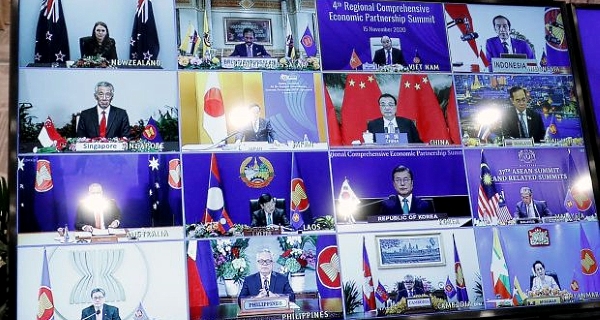
Sin Chew Daily
The 10 member states of Asean, together with China, Japan, South Korea, Australia and New Zealand signed the Regional Comprehensive Economic Partnership (RCEP) on Sunday, November 15, opening up a new chapter in international trade and economic cooperation.
RCEP negotiations have taken eight long years, with some setback, especially the withdrawal of India last year. Fortunately the other member states have exercised utmost wisdom in the negotiations and have managed to dissolve their differences to reach the all-important consensus ultimately.
Based on GDP numbers, the 15-nation grouping will become the world's biggest free trade area, covering almost a third of the world's trade and economic output.
Additionally, the bloc boasts 2.2 billion population, or almost 29.7% of the global total, a really enormous market.
If were were to look at trade and population numbers, indeed the implementation of RCEP will not only have far-fetching effects on the economy of the Asia-Pacific region, but will also set the pace of global economy and trade, especially at a time the global outlook is doomed by the coronavirus pandemic. The birth of RCEP will breathe a new life into the world to help lift the global economy out of the current doldrums and back to the track of growth.
As prime minister Tan Sri Muhyiddin Yassin has said, RCEP is utterly important to this region in tackling the coronavirus pandemic, and could be a very important tool for economic recovery and encourage the reopening of market to ensure supply chain will not be disrupted.
Market sentiment ran high after the signing of RCEP, with stock markets across the region significantly boosted, showing that regional markets are indeed upbeat about the prospects of RCEP.
In the meantime, with the United States practicing unilateralism and protectionism, the signing of RCEP also declares to the world that the Asia Pacific region is embracing free trade and is adopting a path different from that of Washington's.
As the world's largest economy, the exclusion of the US from RCEP shows that its influences in Asia Pacific are expected to weaken further while China will become increasingly influential in the region. We have yet to see whether president-elect Joe Biden will rejoin the Comprehensive and Progressive Agreement for Trans-Pacific Partnership (CPTPP) to expand the country's influences in the region.
Back to Malaysia, the creation of RCEP will invariably have a catalytic effect on the country's economic development and will create enormous new market opportunities for local businesses, giving them a unique chance to expand their markets beyond our shores.
It is imperative that Malaysian businesses seize this unique opportunity to enhance their competitiveness in order to maximize their potentials. Along the way, the government should provide more proactive assistance to local companies so that they will grow stronger and bigger for the prosperity of the whole nation.
In short, RCEP will open up a more expansive economic and trade superhighway which all participating nations should harness to create a win-win situation for greater regional prosperity.
ADVERTISEMENT
ADVERTISEMENT


































